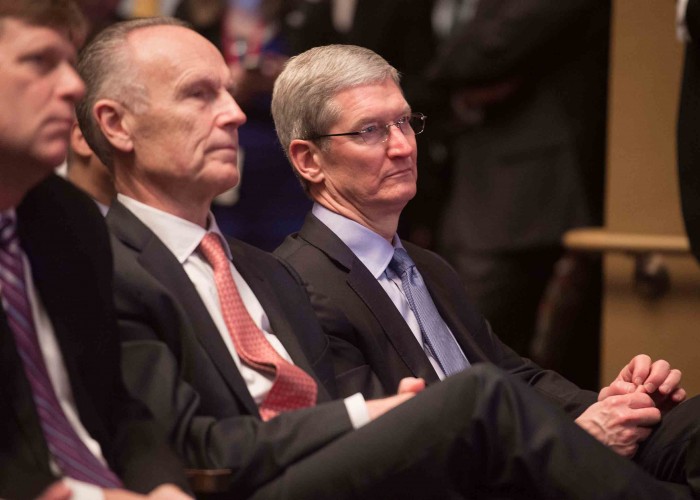Tim Cook Calls for Government Commission to Settle Encryption Fight

Apple CEO Tim Cook issued a memo to his staff Sunday arguing that a government “commission or other panel of experts” is needed to mediate what has become a pitched battle between the tech giant and the FBI. At issue is whether the federal government can compel Apple to create software that would allow the encryption on a dead terrorist’s iPhone to be broken.
Along with the memo, Cook posted a new FAQ in which he acknowledged that it’s possible to comply with the FBI’s request. Doing so would involve creating a new operating system that would allow the FBI to rapidly guess passwords and thus read the content stored on an iPhone left behind by Syed Rizwan Farook.
Farook, who with his wife killed 14 people in a December shooting rampage at a county facility in San Bernardino, California, was later killed in a gun battle with police.
But creating software to crack open Farook’s phone would be “dangerous,” Cook added: “The only way to guarantee that such a powerful tool isn’t abused and doesn’t fall into the wrong hands is to never create it.” He also said that Apple is rejecting the order because it “would set a legal precedent that would expand the powers of the government.”
On Friday, the Department of Justice filed a motion suggesting Cook was grandstanding and that Apple’s main concern was for “its business model and public brand marketing strategy.” And FBI director James Comey followed up on Sunday with a blog post in which he said the showdown “isn’t about trying to set a precedent or send any kind of message.”
“Fourteen people were slaughtered and many more had their lives and bodies ruined. We owe them a thorough and professional investigation under law. That's what this is,” Comey wrote. “We don’t want to break anyone’s encryption or set a master key loose on the land.”
The recent statements cap a week in which a federal court ordered Apple to help the FBI break into the phone, Apple and other tech firms opposed the order, and pundits from all over weighed in on the profound legal questions in play.
(Read more: New York Times, Buzzfeed, “The Legal Question at the Core of the Apple Encryption Standoff”)
Keep Reading
Most Popular
Large language models can do jaw-dropping things. But nobody knows exactly why.
And that's a problem. Figuring it out is one of the biggest scientific puzzles of our time and a crucial step towards controlling more powerful future models.
The problem with plug-in hybrids? Their drivers.
Plug-in hybrids are often sold as a transition to EVs, but new data from Europe shows we’re still underestimating the emissions they produce.
How scientists traced a mysterious covid case back to six toilets
When wastewater surveillance turns into a hunt for a single infected individual, the ethics get tricky.
Google DeepMind’s new generative model makes Super Mario–like games from scratch
Genie learns how to control games by watching hours and hours of video. It could help train next-gen robots too.
Stay connected
Get the latest updates from
MIT Technology Review
Discover special offers, top stories, upcoming events, and more.